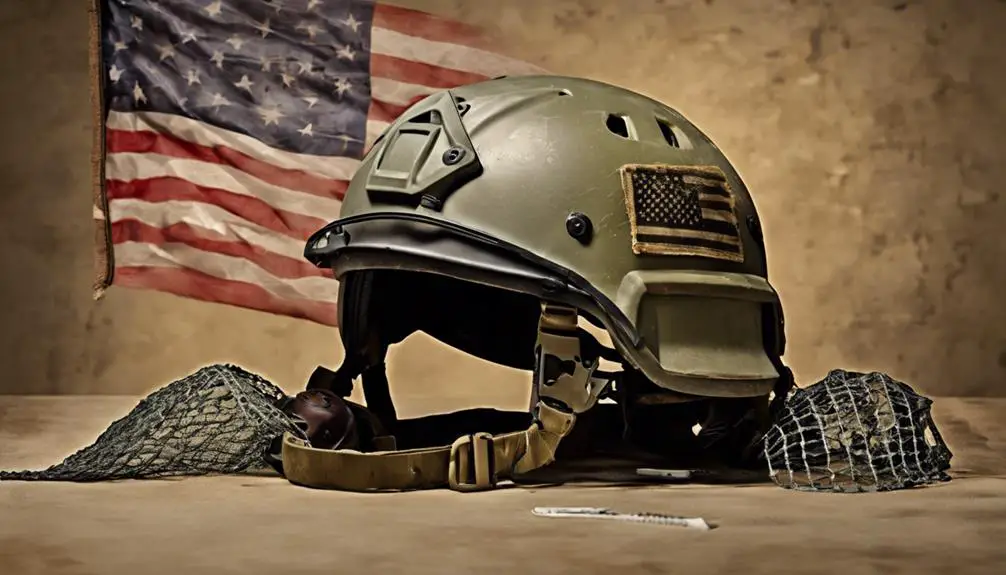You're about to discover the unique language of the military, with 15 slang terms that'll give you a glimpse into their world. You'll learn phrases like HOOAH, expressing enthusiasm and approval, and Roger That, ensuring clear communication. Bravo Zulu acknowledges exceptional work, while Charlie Mike urges teams to persevere. Lima Charlie confirms accurate communication, and Foxtrot Uniform politlely expresses frustration. From Sitrep's tactical assessments to Whiskey Charlie's amphibious assault, these terms reveal the military's efficient communication style. Now, get ready to explore more of this fascinating language and uncover the nuances of military communication.
HOOAH: Expressing Enthusiasm and Approval
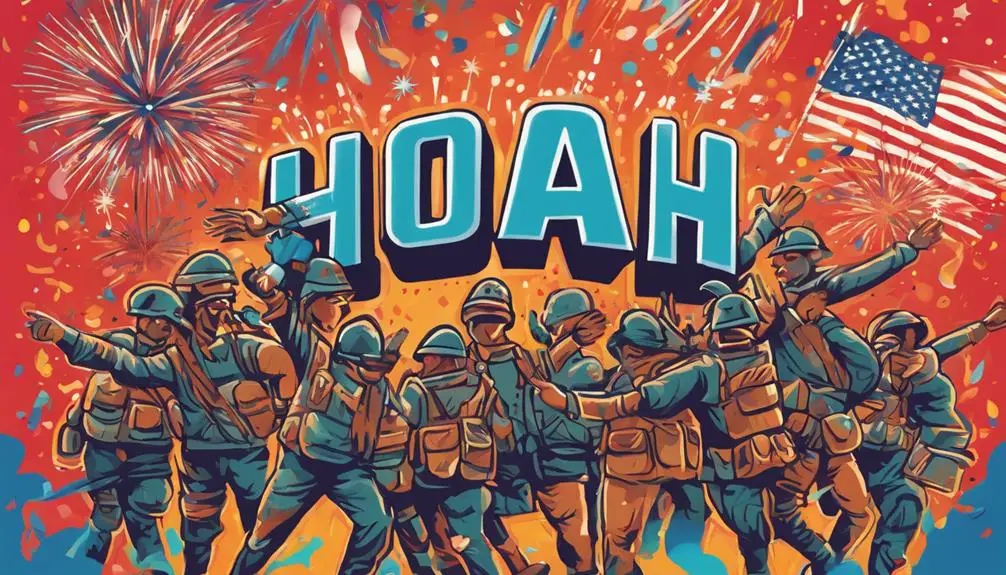
When you hear a fellow soldier exclaim 'HOOAH!' during a challenging training exercise or after a successful mission, they're expressing enthusiasm and approval for a job well done. This iconic battle cry is a staple of military culture, conveying a sense of camaraderie and shared accomplishment. It's a confirmation that acknowledges the hard work and dedication required to overcome obstacles and achieve goals.
In the heat of the moment, a loud 'HOOAH!' can energize and motivate troops, transforming a difficult situation into a triumphant one. This battle cry is often used to celebrate milestones, whether it's completing a grueling obstacle course or successfully executing a complex operation. By shouting 'HOOAH!', soldiers can release pent-up emotions, share in the excitement of achievement, and reinforce the bonds of teamwork.
In essence, 'HOOAH!' is more than just a phrase – it's a symbol of military spirit, a declaration of pride, and a validation of the unbreakable bonds forged in the trenches of service.
FOB: Life on the Forward Operating Base
As you step into the forward operating base (FOB), the hum of generators, the rumble of vehicles, and the chatter of personnel envelop you, immersing you in a world of tactical precision and strategic planning. You're immediately struck by the sense of importance that pervades every aspect of life on the base. Your living quarters, whether a tent or a hardened shelter, become your home away from home. The amenities may be basic, but they're functional, and you learn to appreciate the small comforts.
Base morale is vital to the success of the mission, and every effort is made to keep spirits high. From impromptu sports tournaments to makeshift movie nights, there's always something to look forward to. You'll find that camaraderie and banter are essential components of FOB life, helping to alleviate the stresses of deployment.
Despite the challenges, you'll find a sense of community and belonging that's hard to replicate in the civilian world. As you settle into your new environment, you'll begin to appreciate the unique rhythm of life on the FOB.
Roger That: Affirmative Responses
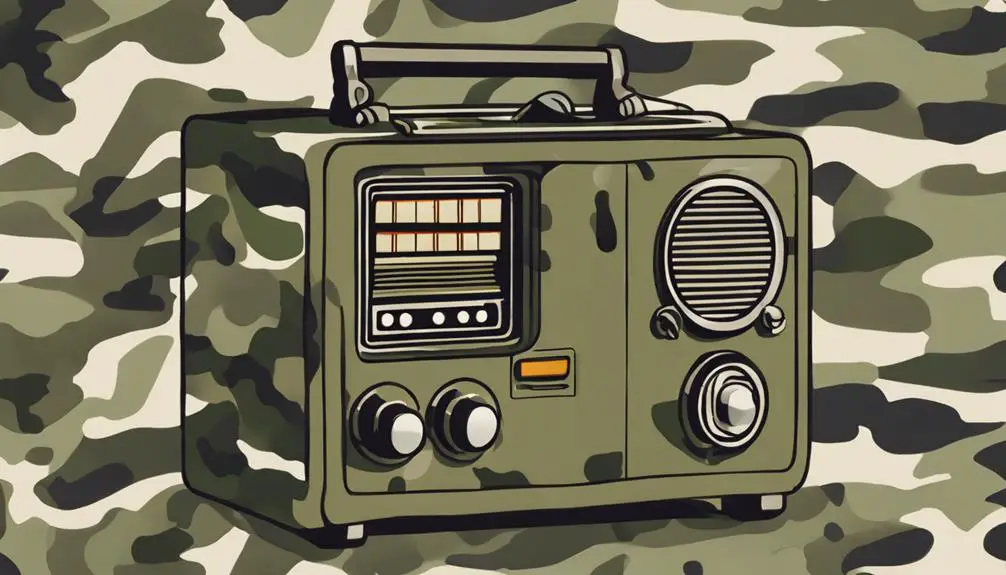
You'll soon discover that affirming orders and instructions with a simple 'Roger that' is an essential part of military communication. This phrase is more than just a casual acknowledgement; it's an important verbal cue that guarantees clear understanding and execution of commands. In high-pressure situations, effective communication strategies are critical, and 'Roger that' provides a clear and concise way to confirm receipt of information.
When you respond with 'Roger that', you're signaling to the sender that you've received and understood the message. This verbal cue helps to prevent miscommunication and makes sure that tasks are completed efficiently. It's an integral part of military communication strategies, allowing teams to work together seamlessly and accomplish their objectives.
In the heat of the moment, 'Roger that' is a reassuring phrase that confirms you're on the same page as your team. It's a simple yet powerful tool that streamlines communication, saving time and lives. By incorporating 'Roger that' into your vocabulary, you'll become a more effective communicator and a valuable asset to your team.
Bravo Zulu: Job Well Done
Upon completing a challenging mission or task, your team leader's 'Bravo Zulu' acknowledgement is music to your ears, signifying a job exceptionally well done. This phrase has a rich history, dating back to the early days of radio communication in the military.
'Bravo' is derived from the International Phonetic Alphabet (IPA), where 'B' is replaced with 'Bravo'. In the 1920s, the U.S. Navy adopted the IPA to clearly communicate letters over radio transmissions.
'Zulu', on the other hand, originates from the time zone identifier, where 'Z' represents the zero-hour time zone, also known as Greenwich Mean Time. When combined, 'Bravo Zulu' literally means 'well done' or 'good job.' In modern military slang, it's used to express admiration and appreciation for a task accomplished with excellence.
When you hear those two words, you know you've made a significant impact and have earned the respect of your peers and superiors.
Charlie Mike: Continue the Mission
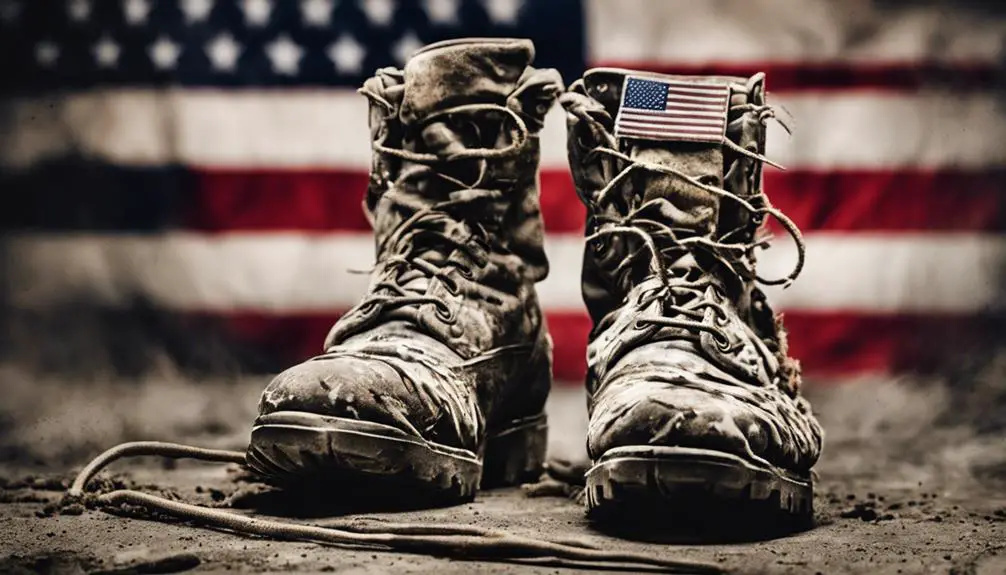
When the mission demands perseverance, 'Charlie Mike' becomes the rallying cry that propels you forward, urging you to continue the mission without hesitation. This phrase, derived from the military alphabet, means 'continue moving' and is often used to motivate troops to push through challenges and stay focused on the mission objective.
As you face obstacles, 'Charlie Mike' reminds you that your Mission Priority is paramount. It's a call to stay committed to the task at hand, even when the going gets tough.
This phrase also speaks to the importance of Team Dynamics, as it emphasizes the need for unity and cooperation to achieve a common goal.
In high-pressure situations, 'Charlie Mike' serves as a reminder that every team member plays a vital role in mission success. It's a phrase that encourages you to draw on your training, trust your teammates, and drive forward together.
Hasta La Vista: Goodbye, Civilian Life
As you transition from your civilian clothes to military attire, 'Hasta La Vista' becomes the unofficial farewell to the comforts and familiarity of civilian life. You're leaving behind the civilian mindset, with its relaxed pace and casual attitude, and embracing a new reality of discipline and structure.
At Boot Camp, you'll be pushed to your limits, physically and mentally, as you undergo a transformation from civilian to soldier. The phrase 'Hasta La Vista' is a nod to the sacrifices you're making, leaving behind the comforts of home and the freedom to make your own choices. It's a bittersweet goodbye, marking the end of one chapter and the beginning of another.
As you commence on this new journey, you'll find that the military's unique culture and lingo become an integral part of your daily life. You'll learn to communicate in a language that's concise, clear, and efficient, with phrases like 'Hasta La Vista' becoming an integral part of your military vernacular.
Got Your Six: Watching Your Back
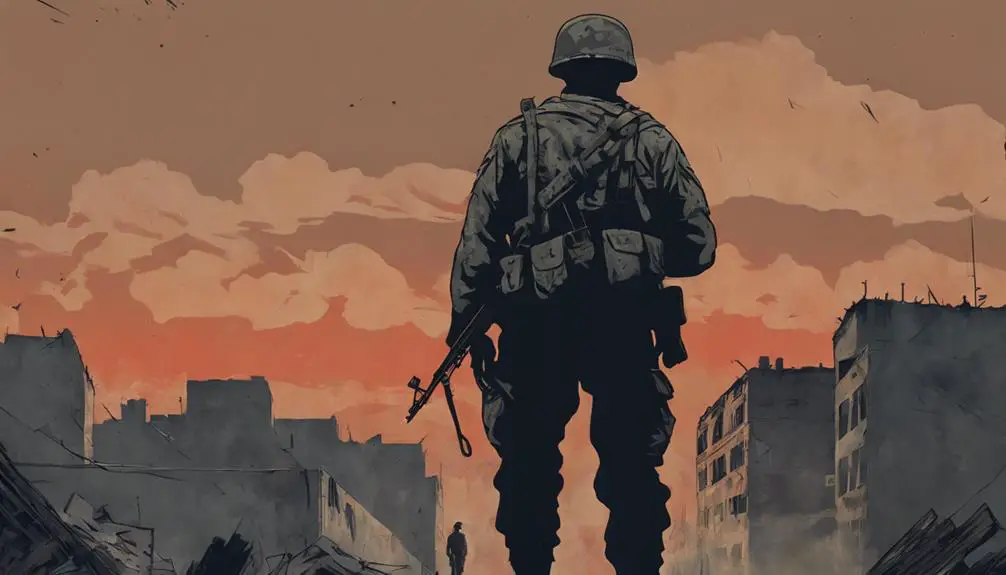
You'll quickly learn that 'Got Your Six' is a phrase that means having someone's back, a reassuring promise that your fellow soldiers will always be looking out for you. In the heat of battle, this phrase is more than just a saying – it's a trust factor that can make the difference between life and death.
When you're in the trenches, you need to know that your Battle Buddies have your back, watching your six o'clock position to make sure you're protected from harm. This unwavering trust is forged through intense training, shared experiences, and dependence on one another for survival. Having someone's six means you're accountable for their safety, and they for yours. It's an unspoken bond that strengthens the camaraderie and loyalty within your unit.
In combat, this trust factor is essential, as it allows you to focus on the mission at hand, knowing your fellow soldiers are watching your back.
Oscar Mike: On the Move
In military communications, 'Oscar Mike' is the phonetic alphabet code for 'on the move,' signaling that a unit is mobile and ready to execute its mission.
When you hear 'Oscar Mike,' you know it's time to get moving. This phrase is vital in Mobile Warfare, where speed and agility are key to gaining a tactical advantage.
As you receive the 'Oscar Mike' call, you'll swiftly deploy to your designated location, following the Tactical Deployment plan. Your unit's mobility is essential in achieving its objectives, and 'Oscar Mike' is the green light to get moving.
Whether you're conducting a rapid insertion, a hasty extraction, or a deliberate attack, 'Oscar Mike' is the cue to put your plan into action. It's a call to action, signaling that it's time to execute your mission with precision and speed.
Sitrep: Situation Report
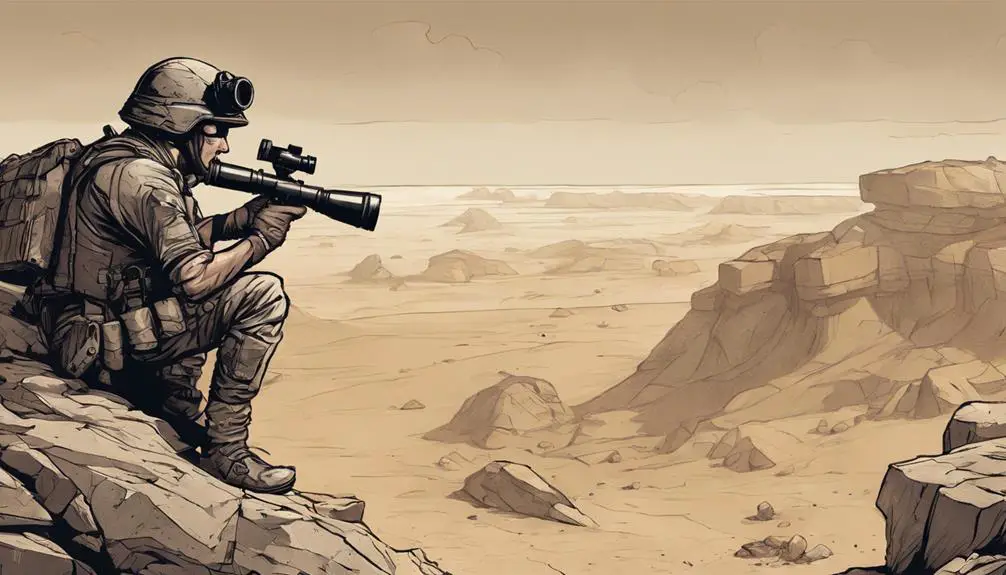
During high-stakes operations, a Sitrep, or Situation Report, provides critical real-time intelligence to commanders, enabling them to adapt their strategy and make informed decisions. As an essential component of battlefield intelligence, a Sitrep offers a thorough overview of the operational environment, helping commanders to stay ahead of the situation.
Here are four key aspects of a Sitrep:
- Tactical assessments: A Sitrep provides a detailed analysis of the tactical situation, including enemy troop movements and disposition.
- Real-time updates: Sitreps are typically issued at regular intervals, ensuring that commanders have access to the most up-to-date information.
- Threat assessments: A Sitrep evaluates potential threats, enabling commanders to adjust their strategy and respond to emerging challenges.
- Operational recommendations: Based on the information gathered, a Sitrep may include recommendations for future operations, helping commanders to make informed decisions.
Tango Uniform: Total Uniform Failure
When communication breaks down, Tango Uniform, or Total Uniform Failure, becomes a harsh reality, disrupting the flow of critical information and hindering mission success. As a soldier, you know that clear communication is key to a successful operation. But when things go wrong, you're left dealing with a Fashion Disaster or Uniform Malfunction, which can have serious consequences.
| Symptom | Consequence |
|---|---|
| Radio malfunction | Delayed intel |
| Misunderstood orders | Wrong target engagement |
| Equipment failure | Reduced firepower |
| Poor navigation | Lost patrol |
| Inadequate supplies | Reduced morale |
In a high-stress environment, you can't afford to have your equipment or comms fail. It's essential to identify the root cause of the issue and rectify it quickly to get back on track. Remember, in the heat of battle, every second counts, and a Tango Uniform can be the difference between success and failure. Stay vigilant, and don't let a Uniform Malfunction compromise your mission.
Whiskey Charlie: Waterborne Operations
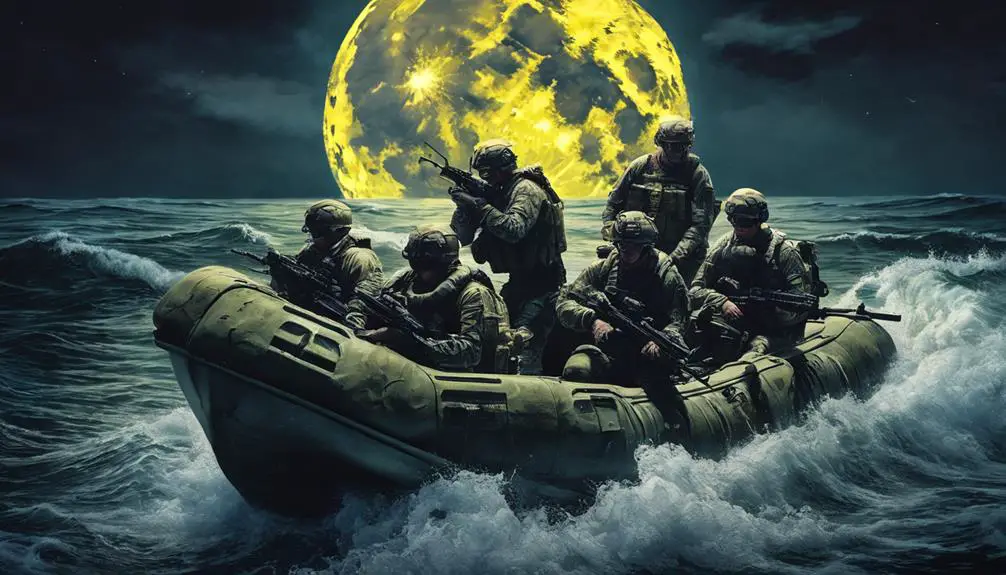
You're boarding watercraft or conducting amphibious assaults, and Whiskey Charlie, or Waterborne Operations, becomes your reality, demanding precision and flexibility to navigate treacherous waters and secure littoral zones. In this high-stakes environment, every move counts, and Whiskey Charlie is the lingo that keeps you connected with your team.
Here are key aspects of Whiskey Charlie:
- Amphibious Assault: Coordinating land, air, and sea forces to secure a beachhead or coastal area.
- Naval Strategy: Developing tactics to outmaneuver the enemy and gain control of the seas.
- Littoral Warfare: Fighting in coastal areas, where the land meets the sea, requiring adaptability and cunning.
- Riverine Operations: Patrolling rivers and waterways to disrupt enemy supply lines and maintain control.
In Whiskey Charlie, communication is key. Every call sign, every code phrase, and every hand signal is essential to mission success.
When you're operating in the unpredictable maritime environment, Whiskey Charlie is the language that keeps you connected and effective.
Lima Charlie: Loud and Clear
In high-stakes situations, Lima Charlie, or Loud and Clear, becomes the crucial communication protocol that guarantees every instruction, every warning, and every command is conveyed accurately and swiftly.
When you're in a high-pressure environment, you can't afford to mishear or misinterpret critical information. That's where Lima Charlie comes in – it's the assurance that your message has been received loud and clear.
In military radio etiquette, Lima Charlie is more than just a phrase; it's a guarantee of clear communication. When you respond with 'Lima Charlie,' you're confirming that you've received the message without error or distortion.
It's a crucial component of radio etiquette, ensuring that critical information is conveyed quickly and accurately.
Foxtrot Uniform: Freaking Up
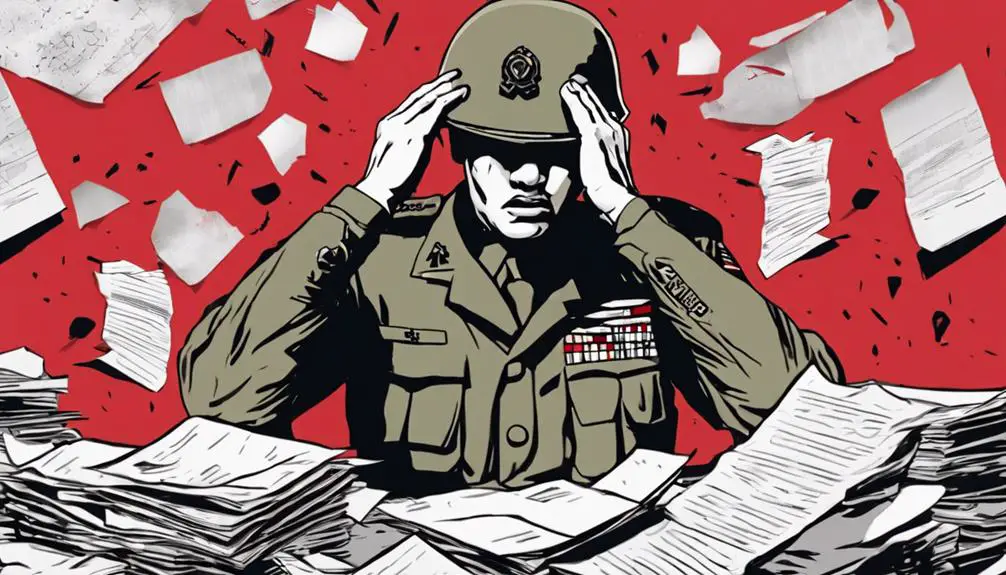
Frustration mounts as miscommunication takes hold, and that's where Foxtrot Uniform comes in – a polite way to express frustration when things are freaking up. You've likely been there, where a mission or operation is going awry, and you're left wondering what's going on. That's when you can utter those two magic words, 'Foxtrot Uniform,' to convey your exasperation without losing your cool.
Here are some scenarios where Foxtrot Uniform might come in handy:
- Fashion Disaster: When your uniform malfunctions, and you're left with a Fashion Disaster on your hands.
- Uniform Malfunction: Your gear fails, and you're stuck dealing with the consequences.
- Miscommunication Mayhem: When messages get lost in translation, and you're left scratching your head.
- Equipment Failure: Your trusty equipment decides to take a break, leaving you high and dry.
Sierra Hotel: Superb Job
When a mission or operation goes exactly as planned, Sierra Hotel is the perfect phrase to express admiration for a superb job. It's a way to acknowledge that everything went smoothly and according to plan, with no hiccups or surprises. Sierra Hotel is more than just a phrase, it's a badge of honor that recognizes exceptional performance and attention to detail.
Here's a breakdown of the benefits of Sierra Hotel culture:
| Aspect | Sierra Benefits | Hotel Culture |
|---|---|---|
| Teamwork | Encourages collaboration and unity | Fosters a sense of camaraderie |
| Performance | Recognizes exceptional results | Encourages individuals to excel |
| Morale | Boosts confidence and morale | Creates a positive and supportive environment |
| Accountability | Promotes accountability and ownership | Encourages individuals to take pride in their work |
| Leadership | Develops strong leaders who lead by example | Inspires leaders to set high standards |
Break Break: Urgent Communication
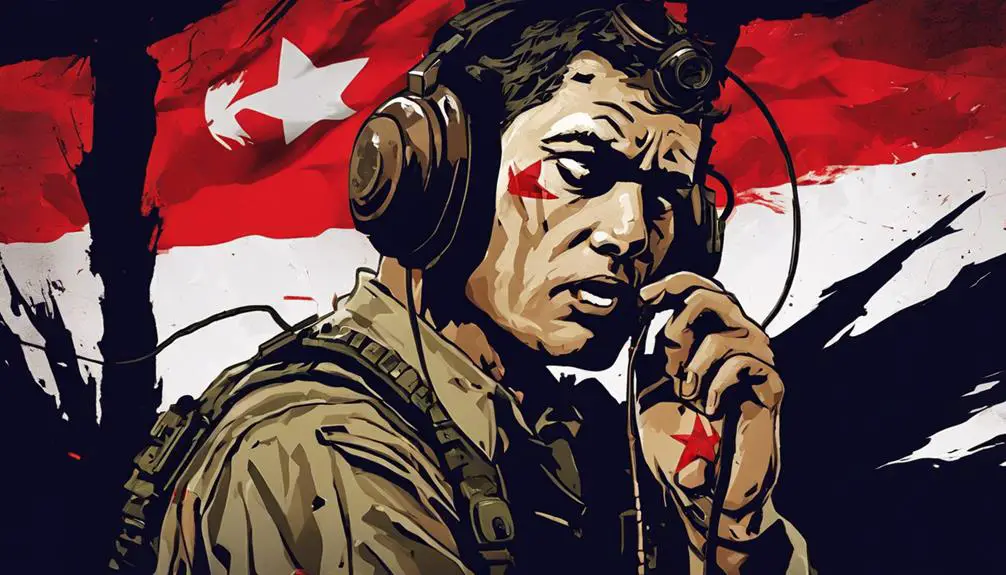
Critical situations demand instant attention, and that's where Break Break comes in, alerting you to urgent communication that requires immediate action. In high-stress environments, every second counts, and Break Break guarantees you're aware of critical messages that need your attention now.
Here are key aspects of Break Break:
- Radio protocols: Break Break follows strict radio protocols to make sure messages are conveyed quickly and efficiently.
- Emergency alerts: This phrase is used to signal emergency alerts, indicating a crisis situation that demands immediate attention.
- Signal priority: Break Break takes priority over other signals, ensuring that critical messages reach you fast.
- Crisis management: By using Break Break, you can respond swiftly to crisis situations, preventing communication breakdown and promoting effective crisis management.
In situations where time is of the essence, Break Break is the military slang term you need to know. It's a vital tool for urgent communication, helping you respond rapidly to emergency situations and maintain seamless communication, even in the most critical moments.
Frequently Asked Questions
Can Military Slang Be Used in Formal Military Communications?
You're wondering if you can use colloquial language in formal military communications. Generally, it's best to avoid using informal slang in official channels, as it can compromise a professional tone.
When communicating through formal channels, you should maintain a formal tone to convey respect and authority. Official military communications require clarity and precision, so it's crucial to stick to standard language to guarantee your message is conveyed effectively.
Are Military Slang Terms Used Universally Across All Branches?
When considering the language used across different military branches, you'll find that terminology can vary to a great extent. Branch variations and inter-service differences lead to distinct dialects, making universal usage of slang terms unlikely.
While some phrases may be shared, each branch has its unique culture and jargon, shaped by their specific roles and histories. As you explore the language used across the Army, Navy, Air Force, and Marines, you'll discover that slang terms aren't universally adopted.
Do Military Slang Terms Change Over Time or Remain Static?
Imagine yourself exploring a vast, ever-changing landscape. You're witnessing evolution in action, where patterns unfold like a tapestry. Now, consider this concept in the domain of language.
Do terms change over time or remain static? The answer lies in their evolution patterns. Historically, language adapts to its context, reflecting the era's values and needs. In this sense, terms aren't set in stone; they evolve, influenced by their historical context.
Can Civilians Use Military Slang in Everyday Conversations?
When incorporating slang from any subculture into everyday conversations, you should consider the implications. Using military slang, in particular, can be seen as cultural appropriation if not done thoughtfully.
Be mindful of social norms and the original context of the terms. If you're not part of the military community, using their slang can come across as inauthentic or even disrespectful.
Be respectful and aware of the cultural context to avoid misappropriation.
Are Military Slang Terms Only Used During Deployment or Combat?
You might think that specialized language is only used during intense situations, but that's not entirely true. In reality, you'll find that battlefield lingo isn't exclusive to deployment or combat zones.
Military personnel often use peacetime slang in their daily conversations, even when they're not in a war zone. It's a way for them to maintain camaraderie and shared identity, even in everyday life.
Conclusion
Now that you've got a taste of military slang, can you imagine the camaraderie and banter among troops? It's more than just a language – it's a culture.
Will you be able to 'Roger That' with confidence? From 'HOOAH' to 'Foxtrot Uniform', these phrases will have you speaking like a pro in no time.
So, what's your next move?

